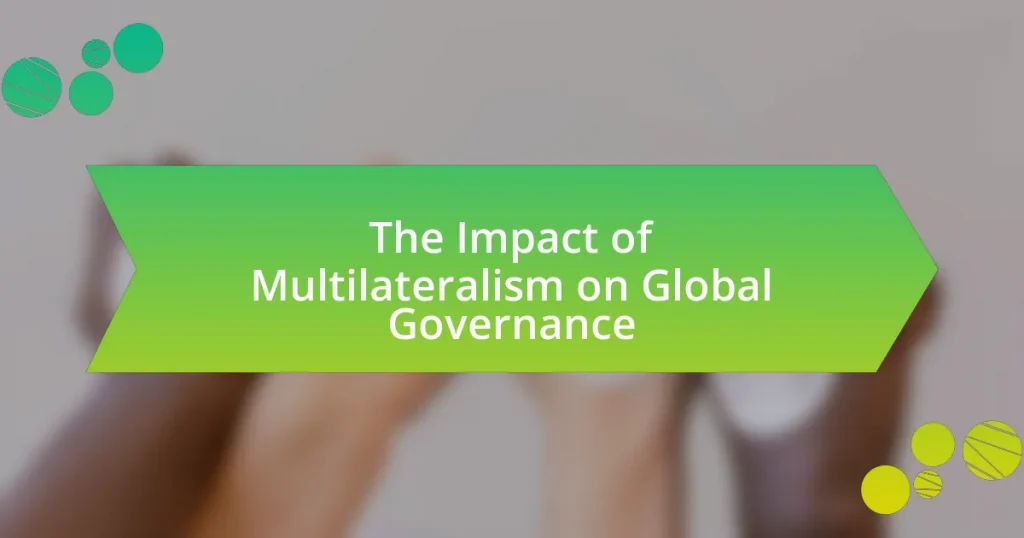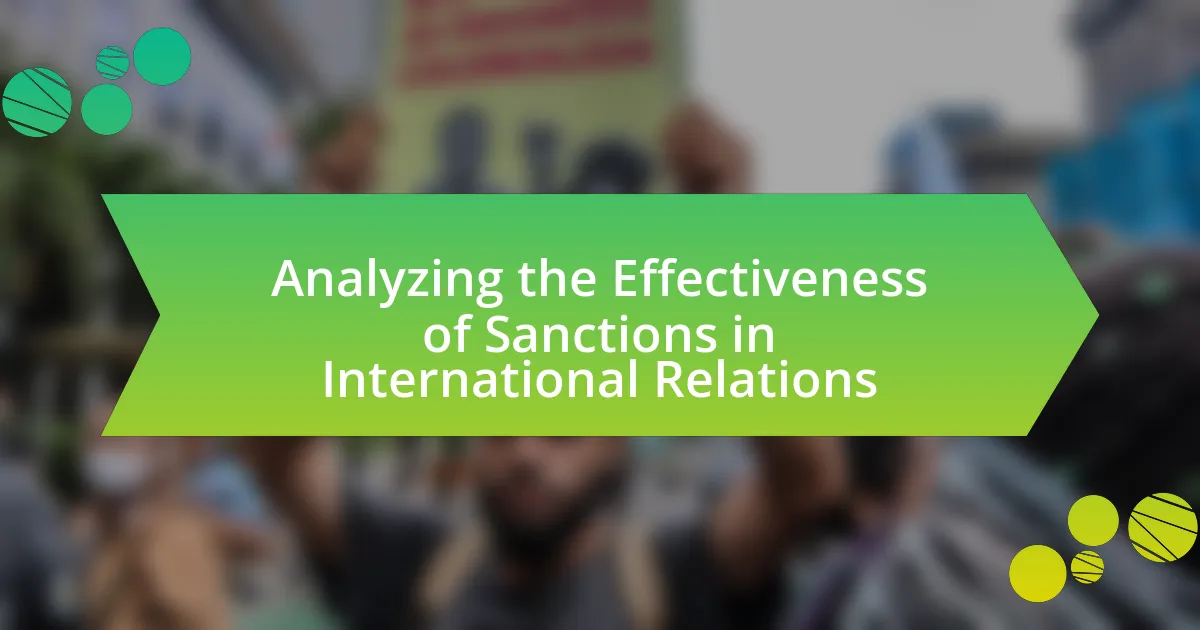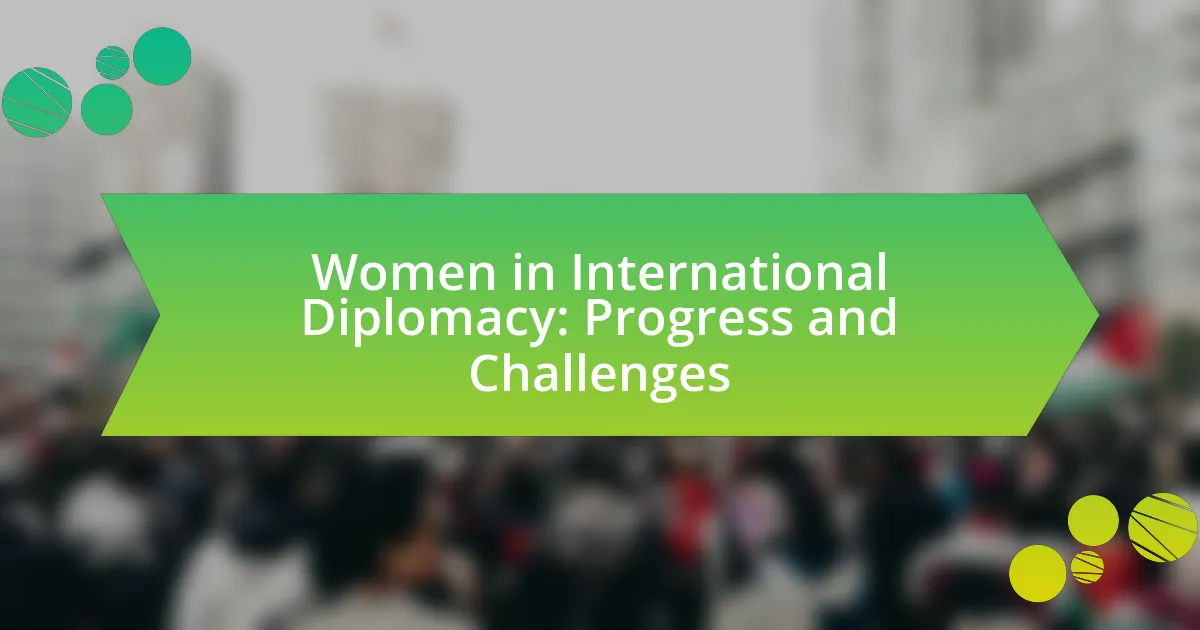The article examines the impact of multilateralism on global governance, highlighting its role in fostering international cooperation to address shared challenges such as climate change, trade, and security. It discusses key principles of multilateralism, including cooperation, inclusivity, and consensus-building, and contrasts it with unilateralism and bilateralism. The article also explores historical developments, significant treaties, and organizations that have shaped multilateralism, while addressing the challenges it faces, such as rising nationalism and economic disparities. Additionally, it outlines necessary reforms for multilateral institutions and emphasizes the importance of civil society in supporting multilateral efforts.

What is the Impact of Multilateralism on Global Governance?
Multilateralism significantly enhances global governance by fostering cooperation among multiple countries to address shared challenges. This collaborative approach leads to more effective solutions for issues such as climate change, trade, and security, as evidenced by international agreements like the Paris Agreement, which unites nations in the effort to combat global warming. Furthermore, multilateral institutions, such as the United Nations, provide a platform for dialogue and negotiation, facilitating consensus-building and collective action. The effectiveness of multilateralism is reflected in the increased ability to mobilize resources and coordinate responses to crises, as seen during the COVID-19 pandemic, where global collaboration was essential for vaccine distribution and public health strategies.
How does multilateralism influence international relations?
Multilateralism significantly influences international relations by fostering cooperation among multiple countries to address global challenges collectively. This approach enhances diplomatic engagement, as seen in organizations like the United Nations, where member states collaborate on issues such as climate change, security, and trade. For instance, the Paris Agreement, adopted in 2015, exemplifies how multilateral efforts can lead to binding commitments from nations to reduce greenhouse gas emissions, demonstrating the effectiveness of multilateralism in shaping global policies and norms.
What are the key principles of multilateralism?
The key principles of multilateralism include cooperation, inclusivity, and consensus-building among multiple states or entities. Cooperation emphasizes the need for countries to work together to address global challenges, such as climate change and security threats, which require collective action. Inclusivity ensures that all relevant stakeholders, including smaller nations and non-state actors, have a voice in decision-making processes, promoting fairness and equity. Consensus-building focuses on achieving agreements that reflect the interests of all parties involved, fostering stability and long-term commitment to international norms. These principles are foundational to organizations like the United Nations, which operates on the premise that multilateral cooperation is essential for effective global governance.
How does multilateralism differ from unilateralism and bilateralism?
Multilateralism involves multiple countries working together to address global issues, while unilateralism refers to a single country acting independently, and bilateralism involves two countries collaborating. In multilateralism, decisions are made collectively, often through international organizations like the United Nations, which facilitates cooperation on issues such as climate change and trade. In contrast, unilateralism can lead to isolationist policies, as seen when the United States withdrew from the Paris Agreement in 2017, prioritizing national interests over global consensus. Bilateralism, exemplified by trade agreements between two nations, allows for focused negotiations but may lack the broader impact of multilateral agreements that address wider global challenges.
Why is multilateralism important for global governance?
Multilateralism is important for global governance because it facilitates cooperation among multiple countries to address complex global issues. This collaborative approach enables nations to pool resources, share knowledge, and create collective solutions to challenges such as climate change, trade disputes, and security threats. For instance, the Paris Agreement on climate change exemplifies how multilateral efforts can lead to binding commitments from countries to reduce greenhouse gas emissions, demonstrating the effectiveness of coordinated action in achieving common goals.
What role does multilateralism play in addressing global challenges?
Multilateralism plays a crucial role in addressing global challenges by facilitating cooperation among multiple countries to tackle issues that transcend national borders. This collaborative approach enables nations to share resources, knowledge, and strategies, which is essential for effectively managing complex problems such as climate change, pandemics, and international security threats. For instance, the Paris Agreement, adopted in 2015, exemplifies how multilateralism can unite countries in a collective effort to combat climate change, with nearly 200 nations committing to reduce greenhouse gas emissions. Such agreements demonstrate that multilateral frameworks are vital for creating binding commitments and fostering accountability among nations, ultimately leading to more effective solutions to global challenges.
How does multilateralism enhance cooperation among nations?
Multilateralism enhances cooperation among nations by providing a structured framework for dialogue and collaboration on global issues. This framework facilitates collective decision-making, allowing countries to address shared challenges such as climate change, trade disputes, and security threats more effectively. For instance, the Paris Agreement, which involves nearly 200 countries, exemplifies how multilateral efforts can lead to coordinated action on climate change, demonstrating that collective commitments can yield significant environmental benefits. Additionally, multilateral organizations like the United Nations foster diplomatic relations and promote peace by encouraging nations to work together, thereby reducing the likelihood of conflicts and enhancing stability.
What are the historical developments of multilateralism?
Multilateralism has evolved significantly since its inception, marked by key historical developments. The establishment of the Concert of Europe in the early 19th century exemplified the first formal multilateral cooperation aimed at maintaining peace among major powers after the Napoleonic Wars. Following World War I, the League of Nations was created in 1920 to promote collective security and prevent future conflicts, although it ultimately failed to prevent World War II. The post-World War II era saw the formation of the United Nations in 1945, which institutionalized multilateralism on a global scale, focusing on peace, security, and human rights. The Bretton Woods Conference in 1944 further solidified economic multilateralism by establishing the International Monetary Fund and the World Bank to foster international economic cooperation. The late 20th century witnessed the rise of regional organizations, such as the European Union, which enhanced multilateral cooperation in trade and political matters. These developments illustrate the progression of multilateralism from informal alliances to structured international institutions, shaping global governance frameworks.
How has multilateralism evolved since the post-World War II era?
Multilateralism has evolved significantly since the post-World War II era, transitioning from a focus on state-centric diplomacy to a more inclusive approach that incorporates non-state actors and global challenges. Initially, multilateralism was primarily embodied in institutions like the United Nations, established in 1945 to promote peace and cooperation among nations. Over the decades, this framework expanded to address a broader range of issues, including economic development, environmental sustainability, and human rights, reflecting the complexities of globalization.
The establishment of the World Trade Organization in 1995 exemplifies this evolution, as it created a platform for negotiating trade agreements among multiple countries, thereby enhancing economic interdependence. Additionally, the rise of regional organizations, such as the European Union and the African Union, illustrates how multilateralism has adapted to regional dynamics while fostering cooperation on shared challenges.
Furthermore, the increasing involvement of non-governmental organizations and civil society in global governance processes highlights a shift towards more participatory forms of multilateralism. This evolution is evidenced by the inclusion of diverse stakeholders in discussions on climate change, exemplified by the Paris Agreement in 2015, which brought together countries, businesses, and civil society to address global warming collectively.
Overall, multilateralism has transformed from a primarily intergovernmental framework to a more complex and inclusive system that seeks to address the multifaceted challenges of the contemporary world.
What significant treaties and organizations have shaped multilateralism?
Significant treaties and organizations that have shaped multilateralism include the United Nations Charter, the North Atlantic Treaty Organization (NATO), and the World Trade Organization (WTO). The United Nations Charter, established in 1945, created a framework for international cooperation and conflict resolution among member states, promoting peace and security. NATO, formed in 1949, exemplifies military cooperation among member countries, enhancing collective defense. The WTO, established in 1995, facilitates international trade agreements and dispute resolution, promoting economic collaboration. These entities have collectively influenced global governance by fostering diplomatic relations, economic partnerships, and security alliances among nations.

What are the challenges faced by multilateralism in global governance?
Multilateralism in global governance faces several significant challenges, including rising nationalism, unequal power dynamics, and the complexity of global issues. Nationalism has led countries to prioritize domestic interests over collective action, undermining international cooperation. Additionally, power imbalances among nations can result in decision-making processes that favor more influential states, marginalizing smaller or less powerful countries. The complexity of global issues, such as climate change and pandemics, requires coordinated responses that are often hindered by differing national priorities and capacities. These challenges impede the effectiveness of multilateral institutions and agreements, making it difficult to achieve consensus and implement solutions on a global scale.
How do geopolitical tensions affect multilateral cooperation?
Geopolitical tensions significantly hinder multilateral cooperation by creating divisions among nations and undermining trust. When countries are embroiled in conflicts or rivalries, they often prioritize national interests over collective goals, leading to stalled negotiations and weakened alliances. For instance, the ongoing tensions between the United States and China have resulted in a lack of consensus on global issues such as climate change and trade, as both nations pursue unilateral strategies that conflict with multilateral frameworks. This dynamic illustrates how geopolitical rivalries can disrupt collaborative efforts, making it challenging to achieve effective global governance.
What impact do rising nationalism and populism have on multilateralism?
Rising nationalism and populism significantly undermine multilateralism by prioritizing national interests over collective global cooperation. This shift is evidenced by the withdrawal of countries from international agreements, such as the United States’ exit from the Paris Agreement in 2017, which reflects a trend where populist leaders reject multilateral frameworks in favor of unilateral actions. Additionally, the rise of nationalist rhetoric often leads to increased protectionism, as seen in trade policies that favor domestic industries at the expense of international partnerships, further eroding the foundations of multilateral institutions.
How do economic disparities among nations challenge multilateral efforts?
Economic disparities among nations challenge multilateral efforts by creating unequal bargaining power and divergent priorities in negotiations. Wealthier nations often dominate discussions, leading to agreements that may not address the needs of poorer countries, which can exacerbate global inequalities. For instance, during the Paris Agreement negotiations, developed countries pushed for stringent climate commitments while developing nations sought financial assistance and technology transfer, highlighting the imbalance in capabilities and responsibilities. This disparity can result in a lack of consensus and hinder effective collaboration on global issues such as climate change, trade, and health crises, ultimately undermining the effectiveness of multilateral institutions.
What are the criticisms of multilateralism?
Criticisms of multilateralism include its perceived inefficiency, lack of accountability, and dominance by powerful states. Critics argue that multilateral institutions often struggle to reach consensus, leading to slow decision-making processes that can hinder timely responses to global issues. Additionally, there is a concern that these institutions may prioritize the interests of more powerful nations, marginalizing smaller or less influential countries. This dominance can result in a lack of accountability, as decisions made by multilateral bodies may not reflect the will of all member states. For instance, the United Nations Security Council has faced criticism for its veto power held by five permanent members, which can stifle broader consensus and equitable representation.
What arguments do critics present against multilateral institutions?
Critics argue that multilateral institutions often prioritize the interests of powerful nations over those of smaller states, leading to unequal representation and influence. This imbalance can result in policies that favor the economic and political agendas of dominant countries, undermining the legitimacy of these institutions. Additionally, critics contend that multilateral organizations can be slow to respond to global crises due to bureaucratic inefficiencies, which can hinder timely action. For instance, during the COVID-19 pandemic, many criticized the World Health Organization for its delayed response and perceived lack of transparency. Furthermore, critics highlight that multilateral agreements may impose constraints on national sovereignty, limiting a country’s ability to make independent decisions that reflect its unique circumstances.
How do issues of accountability and representation arise in multilateralism?
Issues of accountability and representation arise in multilateralism due to the complex interplay of diverse state interests and the mechanisms of decision-making within international organizations. Multilateral institutions often lack clear accountability frameworks, leading to challenges in holding member states responsible for their actions. For instance, the United Nations Security Council’s structure allows for significant power imbalances, where permanent members can veto decisions, undermining equitable representation of all member states. This dynamic can result in decisions that reflect the interests of a few rather than the collective will of the international community, as seen in instances where major powers prioritize national interests over global consensus. Furthermore, the limited participation of non-state actors and marginalized nations in multilateral processes exacerbates the representation issue, leading to a governance system that may not adequately reflect the voices of all stakeholders involved.

How can multilateralism be strengthened for better global governance?
Multilateralism can be strengthened for better global governance by enhancing cooperation among nations through inclusive dialogue and shared decision-making processes. This can be achieved by reforming international institutions to ensure they represent the interests of a broader range of countries, particularly developing nations, thereby increasing their participation in global governance. For instance, the United Nations has been criticized for its lack of representation; reforms that include more equitable voting systems and decision-making structures can empower smaller nations and enhance legitimacy. Additionally, fostering partnerships between governments, civil society, and the private sector can create a more holistic approach to global challenges, as seen in initiatives like the Paris Agreement on climate change, which relies on collective action and commitment from multiple stakeholders.
What reforms are necessary for multilateral institutions?
Reforms necessary for multilateral institutions include enhancing decision-making processes, increasing transparency, and ensuring equitable representation. Enhancing decision-making processes can be achieved by adopting more inclusive frameworks that allow for diverse stakeholder input, which is essential for addressing complex global challenges. Increasing transparency is critical, as it fosters trust and accountability among member states, enabling better cooperation. Ensuring equitable representation involves reforming voting systems and governance structures to reflect the changing dynamics of global power, as evidenced by the growing influence of emerging economies in international affairs. These reforms are vital for multilateral institutions to remain effective and relevant in a rapidly evolving global landscape.
How can member states enhance their commitment to multilateral agreements?
Member states can enhance their commitment to multilateral agreements by actively participating in negotiations, implementing domestic policies that align with international standards, and fostering transparency in their actions. Active participation ensures that member states contribute to the shaping of agreements, which increases ownership and compliance. For instance, the Paris Agreement on climate change saw countries committing to specific targets, which were facilitated by their involvement in the negotiation process. Implementing domestic policies that reflect international commitments, such as environmental regulations or human rights protections, reinforces adherence to multilateral agreements. Transparency, exemplified by regular reporting and accountability measures, builds trust among member states and encourages compliance, as seen in the World Trade Organization’s trade policy reviews.
What role does civil society play in supporting multilateralism?
Civil society plays a crucial role in supporting multilateralism by advocating for inclusive policies and holding governments accountable. Organizations within civil society, such as non-governmental organizations (NGOs) and grassroots movements, engage in dialogue with international institutions, ensuring that diverse voices are represented in multilateral discussions. For instance, during the United Nations Climate Change Conferences, civil society groups have mobilized public opinion and influenced negotiations by presenting scientific evidence and grassroots perspectives, thereby enhancing the legitimacy and effectiveness of multilateral agreements. This engagement fosters transparency and encourages collaboration among states, ultimately strengthening the multilateral framework essential for addressing global challenges.
What best practices can be adopted to improve multilateral cooperation?
To improve multilateral cooperation, establishing clear communication channels among member states is essential. Effective communication fosters transparency and trust, which are critical for collaborative decision-making. For instance, the United Nations employs regular meetings and reports to ensure that all member states are informed and engaged in discussions, enhancing collective action on global issues. Additionally, creating inclusive platforms that allow for diverse stakeholder participation, including non-governmental organizations and civil society, can enrich dialogue and lead to more comprehensive solutions. Research by the OECD highlights that inclusive decision-making processes lead to better policy outcomes and increased buy-in from all parties involved.
How can technology facilitate better communication among nations?
Technology facilitates better communication among nations by enabling instant information exchange and fostering collaboration through digital platforms. For instance, tools like video conferencing, social media, and instant messaging allow leaders and diplomats to engage in real-time discussions, reducing the time lag associated with traditional communication methods. According to a report by the United Nations, the use of digital communication technologies has increased diplomatic engagement, with over 70% of countries utilizing online platforms for international dialogue. This shift not only enhances transparency but also promotes understanding and cooperation on global issues, such as climate change and public health, thereby strengthening multilateralism in global governance.
What strategies can be implemented to foster trust among multilateral partners?
To foster trust among multilateral partners, implementing transparent communication strategies is essential. Transparent communication involves sharing information openly, ensuring that all parties are informed about decisions, intentions, and actions. For instance, the United Nations emphasizes the importance of transparency in its operations, which has been shown to enhance cooperation among member states. Additionally, establishing regular dialogue through forums or meetings can facilitate relationship-building and mutual understanding, as evidenced by the success of the G20 summits in addressing global economic issues. Furthermore, creating joint initiatives or projects can build trust by demonstrating commitment to shared goals, as seen in collaborative efforts like the Paris Agreement on climate change, where countries work together towards common environmental objectives.
What practical steps can nations take to engage in effective multilateralism?
Nations can engage in effective multilateralism by establishing clear communication channels and fostering trust among member states. This involves regular diplomatic dialogues, such as summits and conferences, which facilitate the exchange of ideas and concerns. For instance, the United Nations General Assembly serves as a platform for nations to discuss global issues collaboratively, enhancing mutual understanding and cooperation. Additionally, nations should commit to shared goals and frameworks, such as the Sustainable Development Goals, which provide a common agenda for addressing global challenges. Evidence of successful multilateralism can be seen in the Paris Agreement, where countries collectively agreed to combat climate change, demonstrating the effectiveness of collaborative efforts in achieving significant outcomes.






